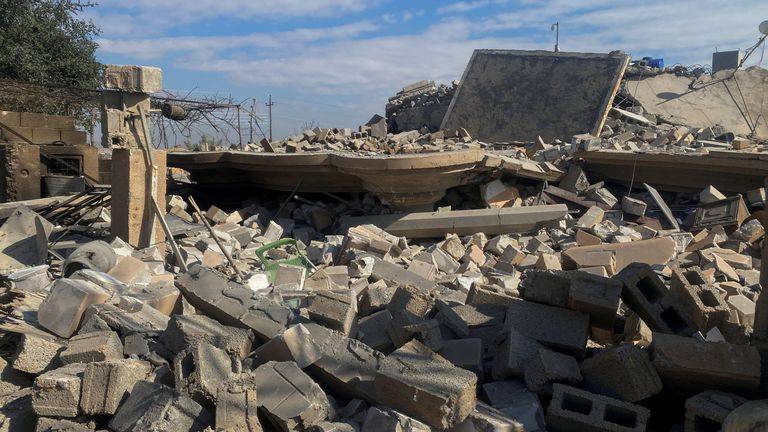
A building destroyed in al-Qaim, Iraq, after US strikes. (Credit:Reuters)
On Friday, as anticipated, the US responded to the killing of three American soldiers at a military base in Jordan on Jan. 28. They targeted 85 sites across 7 locations associated with elite Iranian forces and pro-Iranian armed groups in Iraq and Syria. While this action is unlikely to put an end to recurring attacks by Iranian-affiliated militias against US forces, it could allow a return to the established rules of engagement, avoiding further crossing of red lines. In light of this, what might Teheran's response be? How will they balance their need to assert power while avoiding direct confrontation with Washington? Ali Vaez, Director of the Iran Project at the International Crisis Group, explains.
1) How can Iran respond to this weekend's US strikes?
Iran will not respond directly. The US has targeted Iranian proxies, so Iran will respond through these groups. This will therefore remain a proxy war and not a shooting war between Iran and the US. The irony here is that neither Iran nor the US is interested in an open war, but they both adhere to the same approach to preventing this—escalation for the sake of de-escalation. And neither side is willing to deviate from this policy, lest the other side interprets any sort of concessions or lack of response as a sign of weakness.
This strategy carries risks of mishaps or miscalculations which could lead to uncontrollable tensions, quite simply due to the number of points of friction between the two camps and the vast geographical area in which this competition takes place. It took nearly four months and more than 165 attacks to result in American deaths, but it was only a matter of time before one of the drones or rockets fired at US positions in the region got through and caused fatalities. And every time these incidents occur, Iran and the US move closer to the brink of direct war, even if they don't want it to happen and they calibrate their retaliatory strikes to prevent crossing that threshold. The reason is quite simply that they have no policy other than escalation to defuse the situation. There is no grand strategy here, there are no direct negotiations, and there is no way out other than getting a ceasefire in Gaza, which seems to be a significant challenge at this stage.
2) However Iran promised that in the event of an American attack on its soil, there would be “a response that (would) make the aggressors regret (it).” How seriously should this threat be taken?
There will be an Iranian response if Iranian assets are directly targeted, or if there are deaths among Iranians. There is no doubt about it. Every time there has been one of these kinds of strikes against Iran directly, Iran has retaliated. For example, Israel targeting an Iranian spy ship in 2021 led Iran to target Israeli ships in the Red Sea and Mediterranean. And this cycle lasted for a while. Similarly, when the US attempted to stifle Iranian oil exports, Iran targeted Saudi oil infrastructure or shipping in the Gulf region – although the odds of this happening again are minimal, as Iran has much better relations with the Gulf states today. Finally, when the US assassinated Qassem Soleimani, Iran responded with the largest ballistic missile strike against American forces since World War II, in terms of the number of missiles launched.
If the US decides to strike Iran directly, it means that the kind of US fatalities there have been will have made it inevitable. But Tehran will have to respond, and from then on, it will be very hard to contain the conflict. The reason tensions didn't escalate in 2020 after Iran fired a barrage of missiles into the US base in Ein Al Assad was that miraculously there were more than 100 casualties, but no fatalities. Miracles don't happen all the time.
3) What does each party gain in this sequence of events?
Neither of them is really getting what they want. Iran wants an end to the conflict in Gaza and the expulsion of the US from the region. Yet the Gaza war continues and the US has a larger military footprint in the region than before Oct. 7. Washington also wanted Hamas' destruction, a better flow of humanitarian aid to Gaza, a political process toward a two-state solution, and to contain the war. None of those objectives have been met.
Furthermore, American strikes against Iran's proxies in the region degrade their capabilities, without necessarily deterring them. This policy is therefore doomed to fail. But paradoxically, both Iran and the United States can present their actions as successes. For Washington, the degradation of the capabilities of pro-Iranian militias is a considerable success.
For Iran, the key here is to do enough to preserve the credibility of the resistance axis, both as a deterrence mechanism and also as the ideological umbrella that glues these groups together. The fact that Hezbollah has distracted a significant portion of the Israeli defense forces to the north, that the Houthis have literally disrupted the free flow of trade in the Red Sea and that the US is under siege by militias in Iraq and Syria, demonstrates the alliance is not resting on its laurels. The Iranian formula is therefore simply to continue doing the same thing—imposing a constant price on the West for its support of Israel's war in Gaza. So, once again, both sides lose, but they cling to the minimal achievements they have to justify continuing this policy.
This article was orginally published in French in L'Orient-Le Jour.